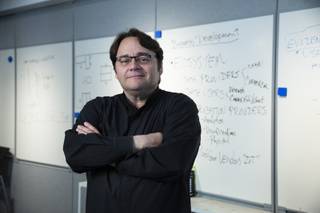When the owners and operators of a Northern California tech startup decided they wanted a fresh start in a new city, Las Vegas seemed like it would be a good landing spot.
“We wanted to go somewhere outside the Bay Area because that place is just out of control,” said David Knight, CEO of Terbine, a growing data company. “One of the reasons why a lot of cities got knocked out of the running was because they didn’t have a good international airport. We also wanted strong access to local universities.”
Las Vegas, of course, does have a well-traveled international airport, along with some other attributes that appealed to Knight and the rest of the Terbine leadership as they plotted an escape from the expensive, crowded Northern California tech landscape.
“(In Las Vegas), we have the ability to kind of be a big fish,” Knight said. “Even Google can barely get the attention of anybody in Northern California because there’s so many giant companies.”
After meeting with Zappos CEO Tony Hsieh and Switch CEO Rob Roy, Knight said he was sold on making Las Vegas the new headquarters for Terbine. More specific, they wanted to be in downtown Las Vegas.
“Young people don’t necessarily want to get in a car to go get a soda or food or, later in the day, alcohol,” Knight said. “Having seen the gentrification of downtown Las Vegas, which I think is amazing, and the continuing plans for it, we said it was going to be downtown Vegas.”
Around the time Terbine was zeroing in on downtown last year, Knight met with Michael Sherwood, director of technology and innovation for the city. By May, the Terbine operation had moved into space inside the Bank of America Plaza the city is leasing on South Fourth Street.
It’s all part of a plan the city has to become more cozy with the tech industry. The city’s 11,000-square-foot space at the complex can be thought of an incubator of sorts, city officials say.
Its roster of tenants also includes Ubicquia, a smart city solutions firm based in Florida that specializes in lighting; a cybersecurity company called SonicWall; and a division of NTT Data Corp., a global information technology firm.
“We were seeing a growing number of these young or small companies that were considering a move to Las Vegas or the opening of an operation here,” said Bill Arent, director of the city’s economic and urban development department. “We decided to take advantage of an opportunity with the Bank of America building after the University of Phoenix closed the RedFlint space a while ago and it’s worked out well.”
As of now, the city is calling the space its Downtown Innovation Center, though the branding could eventually change, Arent said. He said a public rollout of the space, for which the city has a five-year lease, is tentatively planned for later this year.
Arent said the city has the ability to be flexible with office space rental terms. It also has what he referred to as “hot desks,” which basically refers to the renting out of a personal workspace that has Wi-Fi connectivity and use of a common area.
“We’ve had some great interest,” Arent said. “We’ve only had (the center) open for about a month and, except for the hot desks, we’re essentially sold out.”
Having more of tech presence downtown lends itself, Arent said, to Las Vegas’ goal of becoming more of a smart city, where the “Internet of things” can be employed to use sensors and other technologies to collect data and distribute resources more wisely.
Think autonomous vehicles and stop lights that change based on traffic flow or whether any vehicles or pedestrians are about to cross an intersection.
“We want to put technology to work to help the city solve problems,” Arent said. “Whether it’s providing services where you can ask Alexa for the status of a building permit or helping with pedestrian identification to assist with pedestrian safety, we’re looking at doing a lot of different things.”
For Terbine and its two-dozen employees — the company expects to more than double its workforce in the near future — downtown Las Vegas has quickly become home.
If things go according to plan, the company could experience a lot more growth, Knight said.
“Terbine is the first company that’s attempting to build a global exchange for the data about the physical world,” Knight said. “We’re talking about cars, street lamps, water, electricity, air quality, what’s happening in the oceans,” Knight said. “We’ve been working on this quietly for a few years. We’re happy to be in Las Vegas — we’ve already hired about 15 people out of UNLV and I think we’ll hire out of the College of Southern Nevada.”
Knight thinks Las Vegas has a chance to really grow its tech industry credibility factor.
“I haven’t met a mid-sized city that has such an incredible impetus to become a tech center,” Knight said. “We’re in this era where there’s a lot of cool stuff happening in Las Vegas with the Raiders and rumors of a basketball team and possibly a (Major League Soccer) team. We’re all in on Las Vegas and Southern Nevada.”

